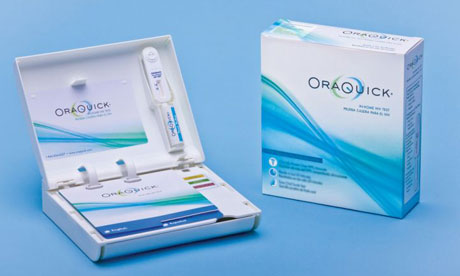
Thousands of people are expected to find out whether they have HIV in the privacy of their own home, following approval by US regulators of a rapid HIV over-the-counter test kit.
The Food and Drug Administration (FDA) has approved OraSure's home test, which the company says will now be available at 30,000 retail outlets across America in October. The saliva test provides a result in 20 to 40 minutes from a quick swab of the upper and lower gums in the mouth.
Until now, testing has been done all over the world almost exclusively in medical settings, with HIV specialists and counsellors close at hand so that people can get reassurance, support and immediate treatment if they need it.
But at least one in five of the 1.2 million Americans who have HIV and a quarter of the more than 86,000 infected living in the UK does not know it.
Many who may realise they are at risk will not go to clinics. And some vote with their feet, buying unapproved, illegal and inaccurate tests online.
The approval in the US was applauded by HIV experts and campaigners . Dr Mariangela Simao of UNAIDS said it was important to offer new ways of testing to people, not all of whom would want their status disclosed in a clinic. There are 34 million people with HIV, many of whom do not know it, she said. "Any means that can ensure people have access and opportunities to be tested and that are not mandatory should be encouraged."
UNAIDS hopes home testing will become available in developing countries, but the price will have to come down considerably from OraSure's prediction of somewhere under $60 (£38) if that is to happen.
The home test will swiftly reach other affluent countries but the UK will not get it without a change in the law. Early in the epidemic, home testing was made illegal to prevent employers from mass testing their workforce.
The House of Lords select committee on Aids recommended last September that the law should be repealed.
The National Aids Trust has campaigned for a change to the law. "It will be far better for the government to legalise and ensure the quality of such kits and that proper information, advice and support are available alongside their use, than for people to access such unlicensed testing kits via the internet," said chief executive Deborah Jack. "We need to work out a way of integrating this new and exciting technology effectively and safely into our testing strategies so that people with HIV are diagnosed as early as possible and can live long and healthy lives."
There are still concerns that the test may not always give the right result, which will either make people unnecessarily anxious or may lead them to take risks. Clinical trials of the OraSure test showed it was accurate 92% of the time in diagnosing people who had HIV. But that means one in every 12 test results would be a false negative, which may encourage people to think they can indulge in unprotected sex.
False positives – where an uninfected person wrongly gets a positive result – were more rare, at one in every 5,000. In May, an FDA advisory committee of outside experts voted unanimously in favour of the test, saying its ability to prevent new HIV infections and link people to medical care and social services outweighed the risk of false results.
The test will come with details of a helpline and access to counselling for those who get a positive result, who will also be urged to get it confirmed by a doctor. In medical settings, testing is inextricably linked to counselling to help people deal with the bad news, tell their sexual partners and get treatment.Douglas Michels, OraSure's chief executive, said the company is planning a "pretty massive effort to communicate with consumers" after the autumn launch. A direct to consumer campaign will include television, print, radio and social media advertising.
Enthusiasm for a home test has grown among experts. People who do not know they have HIV are most likely to infect others. They will be less likely to take precautions, such as using condoms. But they will also be more infectious than those who are on antiretroviral drugs to keep their viral load down and disease at bay. Recent studies have shown that transmission rates to sexual partners drop to vanishingly low levels if people with HIV are put on combination drug therapy early on.It has also become increasingly important to identify HIV infected people early for their own sake, because the outcome is far better if they start drugs before they get physical symptoms. Half of those with HIV are diagnosed late, when they have become ill and need treatment.
Lisa Power of the Terrence Higgins Trust said they had been waiting for the FDA approval. "We are absolutely delighted at the announcement," she said.
"It marks a real sea-change."
Those who are anxious about the outcome of a test for HIV should be urged to go to a clinic and not try to cope at home, she said. "But there are a lot of people now who are buying illegal tests off the internet of very poor quality." Patient choice was important, she said, and if people wanted to test in their own homes, they should be able to do so.

